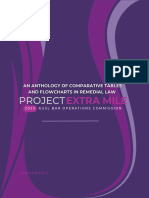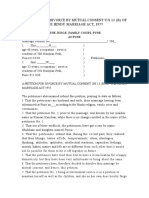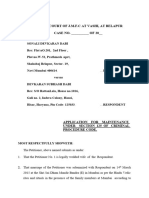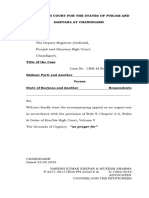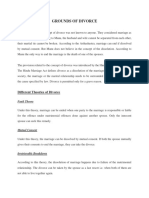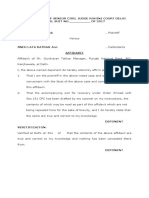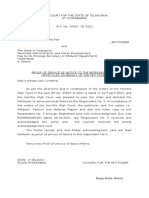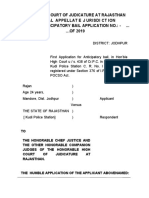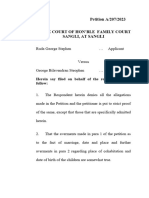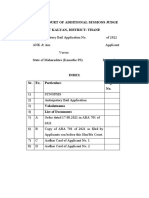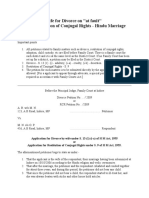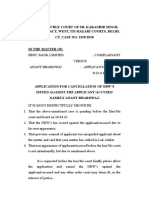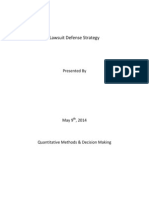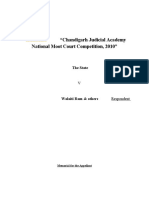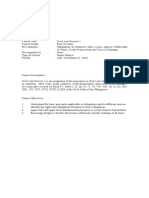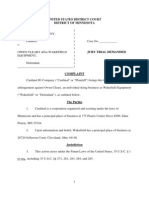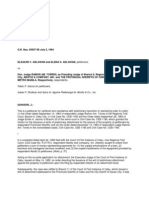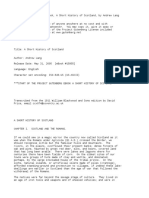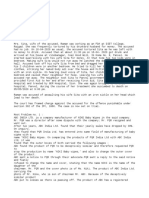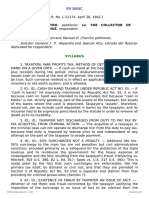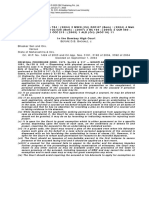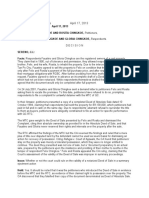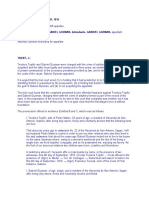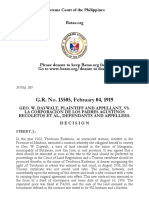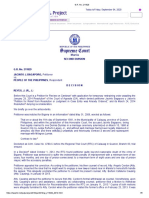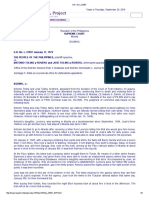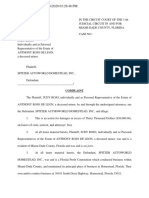0 ratings0% found this document useful (0 votes)
256 viewsDivorce After Covid
Divorce After Covid
Uploaded by
Bala SubraThe appellant wife filed an appeal against her husband being granted a divorce decree on the grounds of cruelty. The couple had married in 2008 and had one child, but the wife left her marital home in 2008. In 2009, the husband filed for divorce but the parties later compromised, with the husband agreeing to pay maintenance. However, in 2012 the wife refused mutual divorce. The husband then filed again for divorce on grounds of cruelty. Witnesses supported the husband's claims of maltreatment by the wife. The court dismissed the appeal, finding the wife had treated the husband with cruelty and the divorce decree was valid.
Copyright:
© All Rights Reserved
Available Formats
Download as PDF, TXT or read online from Scribd
Divorce After Covid
Divorce After Covid
Uploaded by
Bala Subra0 ratings0% found this document useful (0 votes)
256 views8 pagesThe appellant wife filed an appeal against her husband being granted a divorce decree on the grounds of cruelty. The couple had married in 2008 and had one child, but the wife left her marital home in 2008. In 2009, the husband filed for divorce but the parties later compromised, with the husband agreeing to pay maintenance. However, in 2012 the wife refused mutual divorce. The husband then filed again for divorce on grounds of cruelty. Witnesses supported the husband's claims of maltreatment by the wife. The court dismissed the appeal, finding the wife had treated the husband with cruelty and the divorce decree was valid.
Original Description:
This Document relates to Divorce Rates increasing after Covid
Copyright
© © All Rights Reserved
Available Formats
PDF, TXT or read online from Scribd
Share this document
Did you find this document useful?
Is this content inappropriate?
The appellant wife filed an appeal against her husband being granted a divorce decree on the grounds of cruelty. The couple had married in 2008 and had one child, but the wife left her marital home in 2008. In 2009, the husband filed for divorce but the parties later compromised, with the husband agreeing to pay maintenance. However, in 2012 the wife refused mutual divorce. The husband then filed again for divorce on grounds of cruelty. Witnesses supported the husband's claims of maltreatment by the wife. The court dismissed the appeal, finding the wife had treated the husband with cruelty and the divorce decree was valid.
Copyright:
© All Rights Reserved
Available Formats
Download as PDF, TXT or read online from Scribd
Download as pdf or txt
0 ratings0% found this document useful (0 votes)
256 views8 pagesDivorce After Covid
Divorce After Covid
Uploaded by
Bala SubraThe appellant wife filed an appeal against her husband being granted a divorce decree on the grounds of cruelty. The couple had married in 2008 and had one child, but the wife left her marital home in 2008. In 2009, the husband filed for divorce but the parties later compromised, with the husband agreeing to pay maintenance. However, in 2012 the wife refused mutual divorce. The husband then filed again for divorce on grounds of cruelty. Witnesses supported the husband's claims of maltreatment by the wife. The court dismissed the appeal, finding the wife had treated the husband with cruelty and the divorce decree was valid.
Copyright:
© All Rights Reserved
Available Formats
Download as PDF, TXT or read online from Scribd
Download as pdf or txt
You are on page 1of 8
MANU/PH/3426/2014
IN THE HIGH COURT OF PUNJAB AND HARYANA AT CHANDIGARH
FAO-M-315 of 2013
Decided On: 16.12.2014
Appellants: Nisha Rani
Vs.
Respondent: Ashok Kumar
Hon'ble Judges/Coram:
Ajay Kumar Mittal and Sneh Prashar, JJ.
Counsels:
For Appellant/Petitioner/Plaintiff: Inderjeet Sharma, Advocate
For Respondents/Defendant: Munish Bansal, Advocate
Case Note:
Family - Divorce - Cruelty - Section 13(1) of Hindu Marriage Act, 1955 and
Sections 406 and 498-A of Indian Penal Code, 1860 - Present appeal filed
against judgment and decree whereby, petition filed by
Respondent/husband under Section 13(1) of Act for dissolution of marriage
by decree of divorce was allowed on ground that Appellant/wife treated
Respondent with cruelty - Whether Appellant had treated Respondent with
cruelty so as to entitle Respondent for decree of divorce - Held, as per
settlement between parties, it was agreed that Respondent would pay
specified amount to Appellant towards future and past maintenance and all
other expenses of her marriage - Appellant agreed to withdraw complaint
filed under Sections 406 and 498-A of Code against Respondent and his
family members - However, Appellant after some time refused to agree for
divorce by mutual consent and also refused to repay amount received by
her - Appellant had stated that she was ready to reside with Respondent
but not in joint family and she deserted Respondent - Witnesses has
supported version of Respondent regarding maltreatment and harassment
by Appellant to Respondent and his family members - Therefore, Appellant
had treated Respondent with cruelty and decree of divorce was valid -
Appeal dismissed. [para 15]
JUDGMENT
Ajay Kumar Mittal, J.
1 . This appeal has been filed by the wife against the judgment and decree dated
21.8.2013 passed by the Additional District Judge, Bathinda, whereby the petition
filed by the husband under Section 13(1) of the Hindu Marriage Act, 1955 (in short
"the Act") for dissolution of marriage by a decree of divorce was allowed.
2 . The facts, in brief, necessary for adjudication of the present appeal as narrated
therein may be noticed. The instant petition has been filed with the averments that
the marriage of the parties was solemnized on 24.4.2008 at Bathinda according to
Hindu Vedic rites and ceremonies. After the marriage, the parties resided together as
husband and wife at Maur Mandi, District Bathinda and consummated the marriage.
10-2017 (Page 1 of 8) www.manupatra.com Punjab and Haryana High Court Bar A
Out of the said wedlock, one child, namely, Devansh was born who at presently is
residing with the appellant. The appellant was a quarrelsome lady and started
harassing and humiliating the respondent and his family members. She showed
disrespect and disregard to the parents of the respondent. She used to spend lavishly
the hard earned money of the respondent. The appellant under the influence of her
parents pressurized the respondent to live separately and to transfer ownership of the
house in her name. Even the appellant threatened the respondent and his family
members to falsely involve in criminal cases if they did not toe her line. In the month
of May, 2008, the appellant along with her minor son went to her parental house with
her brother and promised to come back after some days. She also took away all her
gold ornaments and other valuables and cash of ' 10,000/-. When the appellant did
not return back after considerable time, the respondent went to her parental house to
bring her back but she flatly refused to accompany him. The respondent also
convened a Panchayat to take her to the matrimonial home but to no avail. In
November, 2008, the respondent filed a petition under Section 9 of the Act for
restitution of conjugal rights which was withdrawn on 12.10.2009. The appellant filed
a criminal complaint under Sections 406, 498-A, 506, 323, 109 of the Indian Penal
Code against the respondent and his family members. The respondent filed divorce
petition under Section 13 of the Act on 20.11.2009. However, in the said
proceedings, the parties compromised the matter. As per the said compromise, the
respondent was to pay a total sum of ' 3 lacs as permanent alimony including past,
present and future maintenance. Thereafter, the divorce petition under Section 13 of
the Act filed on 20.11.2009 was withdrawn and a joint petition under Section 13-B of
the Act was filed on 28.1.2012. The respondent paid ' 1,25,000/- to the appellant at
the time of statement of first motion and the balance amount of ' 1,75,000/- was to
be paid at the time of second motion statement. On 6.8.2012, when the case was
fixed for recording of statement on second motion, the appellant made a statement
that she did not want to take divorce by mutual consent even after receiving a sum of
' 1,25,000/- as part payment of permanent alimony. The trial court vide judgment
dated 6.8.2012 dismissed the petition as infructuous filed under Section 13-B of the
Act. During the stay of the parties, the appellant treated the respondent with cruelty.
Accordingly, the respondent filed the petition under Section 13 of the Act for
dissolution of marriage by a decree of divorce. The said petition was contested by the
appellant by filing a written statement. Besides raising various preliminary objections
in the written statement, it was pleaded that the respondent agreed to pay a total
sum of ' 8,25,000/-, i.e. ' 1,25,000/- towards the arrears of interim maintenance
awarded by the Chief Judicial Magistrate, Bathinda vide order dated 24.4.2010 at the
rate of ' 2000/- per month (' 1000/- p.m. for the appellant and ' 1000/- p.m. for the
minor child); ' 3 lacs as lump sum amount for the appellant, ' 2 lacs as lump sum
amount for the minor child and ' 2 lacs paid to him in cash at the time of marriage.
The respondent also failed to return the dowry articles given at the time of marriage
and had only paid ' 1,25,000/- towards arrears of interim maintenance. It was further
alleged that on 29.1.2009, the appellant gave birth to a son but the respondent and
his family members had not come to see the child. The other averments made in the
petition were denied and a prayer for dismissal of the petition was made. From the
pleadings of the parties, the trial court framed the following issues:-
) Whether the respondent treated the petitioner with cruelty? OPP
) Whether the respondent has deserted the petitioner, without any reasonable
cause? OPP
10-2017 (Page 2 of 8) www.manupatra.com Punjab and Haryana High Court Bar A
) Whether the petitioner is entitled to decree of divorce for dissolution of
their marriage? OPP
) Whether the petitioner has concealed material and true facts from this
Court? OPR
) Relief.
3 . The respondent in support of his case besides examining himself as PW4,
examined Pawan Kumar as PW1, Sanjeev Kumar as PW2 and Ramesh Kumar as PW3.
To rebut the evidence of the respondent, the appellant herself appeared as RW1 and
examined her uncle Amar Nath as RW2 and her brother Vishal Kumar as RW3 who
tendered their respective affidavits in evidence. She also tendered in evidence order
dated 28.1.2012 as Ex.R1 and order dated 24.4.2012 as Ex.R2.
4. The trial court on appreciation of evidence led by the parties, decided issue No. 1
in favour of the respondent holding that the appellant treated the respondent with
cruelty as she had levelled the allegations without any supporting evidence. Issues
No. 2 was decided in favour of the respondent holding that the appellant had
deserted him without any sufficient cause as she was ready to live with the
respondent with the condition that she would not reside in the joint family. Issues
No. 3 and 4 were decided against the appellant. Accordingly, the trial court vide
judgment and decree dated 21.8.2013 passed a decree of divorce in favour of the
respondent. Hence, the present appeal by the wife.
5 . Learned counsel for the appellant submitted that the respondent-husband was
required to establish cruelty after the earlier petition filed under Section 13 of the Act
was withdrawn. According to the learned counsel, no fresh instances had been
enumerated in the petition or any evidence was led to show that there was cruelty
after the withdrawal of the petition under Section 13-B of the Act. In such
circumstances, the acts having been condoned by way of filing petition under Section
13-B of the Act which was dismissed as infructuous, Ex.P3, the divorce petition
allowed by the trial court was erroneous.
6 . On the other hand, learned counsel for the respondent besides supporting the
judgment and decree passed by the trial court submitted that the husband and other
relations were acquitted on 5.3.2014 by the trial court in a complaint filed by the
appellant under Sections 406, 498-A, 506, 323, 109 of the Indian Penal Code.
7 . After hearing learned counsel for the parties and perusing the record, we do not
find any merit in the contentions of learned counsel for the appellant.
8. The question that arises for consideration in this appeal is whether the appellant
had treated the respondent with cruelty more particularly in view of the acquittal of
the husband and his family members of matrimonial offences under Sections 406,
498-A, 506, 323, 109 of the Indian Penal Code so as to entitle him to a decree of
divorce under Section 13(1)(ia) of the Act.
9. Section 13(1)(ia) of the Act empowers the Court to dissolve the matrimonial ties
between the parties by a decree of divorce on a petition by either spouse where the
said spouse has been treated with cruelty after the solemnization of the marriage.
Cruelty has not been defined in the Act but various pronouncements of the Apex
Court and other High Courts have outlined the scope of the term 'cruelty'. Cruelty is
evident where one spouse treats the other and manifests such feelings towards him
10-2017 (Page 3 of 8) www.manupatra.com Punjab and Haryana High Court Bar A
or her as to cause reasonable apprehension that it will be harmful or injurious to live
with the other spouse. Cruelty may be physical or mental. Whether a spouse is
inflicted with physical cruelty or not, it can be judged on the basis of direct evidence
whereas mental cruelty is to be inferred on analyzing the factual matrix of each case
and drawing conclusion thereon.
10. The Apex Court in Parveen Mehta v. Inderjit Mehta MANU/SC/0582/2002 : 2002
(3) RCR (Civil) 529 had very elaborately analyzed the expression 'cruelty' as a ground
of divorce under the Act. The relevant portion thereof reads thus:-
"Under the statutory provision cruelty includes both physical and mental
cruelty. The legal conception of cruelty and the kind of degree of cruelty
necessary to amount to a matrimonial offence has not been defined under the
Act. Probably, the Legislature has advisedly refrained from making any
attempt at giving a comprehensive definition of the expression that may
cover all cases, realising the danger in making such attempt. The accepted
legal meaning in England as also in India of this expression, which is rather
difficult to define, had been 'conduct of such character as to have caused
danger to life, limb or health (bodily or mental), or as to give rise to a
reasonable apprehension of such danger.
XX XX XX
XX XX XX
2 1 . Cruelty for the purpose of Section 13(1)(ia) is to be taken as a
behaviour by one spouse towards the other which causes reasonable
apprehension in the mind of the latter that it is not safe for him or her to
continue the matrimonial relationship with the other. Mental cruelty is a state
of mind and feeling with one of the spouses due to the behaviour or
behavioural pattern by the other. Unlike the case of physical cruelty the
mental cruelty is difficult to establish by direct evidence. It is necessarily a
matter of inference to be drawn from the facts and circumstances of the case.
A feeling of anguish, disappointment and frustration in one spouse caused by
the conduct of the other can only be appreciated on assessing the attending
facts and circumstances in which the two partners of matrimonial life have
been living. The inference has to be drawn from the attending facts and
circumstances taken cumulatively. In case of mental cruelty it will not be a
correct approach to take an instance of misbehaviour in isolation and then
pose the question whether such behaviour is sufficient by itself to cause
mental cruelty. The approach should be to take the cumulative effect of the
facts and circumstances emerging from the evidence on record and then draw
a fair inference whether the petitioner in the divorce petition has been
subjected to mental cruelty due to conduct of the other."
11. Further, setting out illustrative cases of mental cruelty, the Supreme Court in
Samar Ghosh v. Jaya Ghosh, MANU/SC/1386/2007 : (2007) 4 SCC 511 had held as
under:-
"No uniform standard can ever be laid down for guidance, yet we deem it
appropriate to enumerate some instances of human behaviour which may be
relevant in dealing with the cases of 'mental cruelty'. The instances indicated
in the succeeding paragraphs are only illustrative and not exhaustive.
10-2017 (Page 4 of 8) www.manupatra.com Punjab and Haryana High Court Bar A
(i) On consideration of complete matrimonial life of the parties,
acute mental pain, agony and suffering as would not make possible
for the parties to live with each other could come within the broad
parameters of mental cruelty.
(ii) On comprehensive appraisal of the entire matrimonial life of the
parties, it becomes abundantly clear that situation is such that the
wronged party cannot reasonably be asked to put up with such
conduct and continue to live with other party.
(iii) Mere coldness or lack of affection cannot amount to cruelty,
frequent rudeness of language, petulance of manner, indifference
and neglect may reach such a degree that it makes the married life
for the other spouse absolutely intolerable.
(iv) Mental cruelty is a state of mind. The feeling of deep anguish,
disappointment, frustration in one spouse caused by the conduct of
other for a long time may lead to mental cruelty.
(v) A sustained course of abusive and humiliating treatment
calculated to torture, discommode or render miserable life of the
spouse.
(vi) Sustained unjustifiable conduct and behaviour of one spouse
actually affecting physical and mental health of the other spouse.
The treatment complained of and the resultant danger or
apprehension must be very grave, substantial and weighty.
(vii) Sustained reprehensible conduct, studied neglect, indifference
or total departure from the normal standard of conjugal kindness
causing injury to mental health or deriving sadistic pleasure can also
amount to mental cruelty.
(viii) The conduct must be much more than jealousy, selfishness,
possessiveness, which causes unhappiness and dissatisfaction and
emotional upset may not be a ground for grant of divorce on the
ground of mental cruelty.
(ix) Mere trivial irritations, quarrels, normal wear and tear of the
married life which happens in day to day life would not be adequate
for grant of divorce on the ground of mental cruelty.
(x) The married life should be reviewed as a whole and a few
isolated instances over a period of years will not amount to cruelty.
The ill-conduct must be persistent for a fairly lengthy period, where
the relationship has deteriorated to an extent that because of the
acts and behaviour of a spouse, the wronged party finds it extremely
difficult to live with the other party any longer, may amount to
mental cruelty.
(xi) If a husband submits himself for an operation of sterilization
without medical reasons and without the consent or knowledge of
his wife and similarly if the wife undergoes vasectomy or abortion
without medical reason or without the consent or knowledge of her
10-2017 (Page 5 of 8) www.manupatra.com Punjab and Haryana High Court Bar A
husband, such an act of the spouse may lead to mental cruelty.
(xii) Unilateral decision of refusal to have intercourse for
considerable period without there being any physical incapacity or
valid reason may amount to mental cruelty.
(xiii) Unilateral decision of either husband or wife after marriage not
to have child from the marriage may amount to cruelty.
(xiv) Where there has been a long period of continuous separation, it
may fairly be concluded that the matrimonial bond is beyond repair.
The marriage becomes a fiction though supported by a legal tie. By
refusing to sever that tie, the law in such cases, does not serve the
sanctity of marriage; on the contrary, it shows scant regard for the
feelings and emotions of the parties. In such like situations, it may
lead to mental cruelty."
12. In addition to the aforesaid, certain other illustrations were added by the Apex
Court in K. Srinivas Rao v. D.A. Deepa MANU/SC/0180/2013 : (2013) 5 SCC 226 as
under:-
"Making unfounded indecent defamatory allegations against the spouse or his
or her relatives in the pleadings, filing of complaints or issuing notices or
news items which may have adverse impact on the business prospect or the
job of the spouse and filing repeated false complaints and cases in the court
against the spouse would, in the facts of a case, amount to causing mental
cruelty to the other spouse."
1 3 . Elucidating 'mental cruelty' the Apex Court in K. Srinivas Rao's case (supra)
concluded that if a false criminal complaint is filed against the spouse and his/her
relatives regarding matrimonial offences, it would be a case of mental cruelty.
Following the aforesaid pronouncement, the Division Bench of this Court in Imlesh v.
Amit, MANU/PH/1057/2014 : AIR 2014 Punjab and Haryana 89, observed as under:-
"So far as the finding of the trial Court regarding cruelty on the basis of
involvement in a false criminal case is concerned, it may be said that it in
itself constitutes sufficient ground for granting divorce as it amounted to
cruelty. Reference in this regard may be made to the case in K. Srinivas Rao
v. D.A. Deepa MANU/SC/0180/2013 : (2013) 5 SCC 226: AIR 2013 SC 2176,
where it was held by Hon'ble the Supreme Court that where indecent/
defamatory statements are made in the complaint/ criminal proceedings, the
same singly and cumulatively amounted to mental cruelty warranting grant of
divorce. If a false complaint is filed against the spouse or his/her relatives, it
amounted to mental cruelty. In the said case also, wife had filed a case
under Section 498-A IPC and the husband and his family members were
acquitted and decree of divorce was granted to the husband on that ground,
as it amounted to mental cruelty."
14. Similar view was reiterated by the Supreme Court in K. Srinivas v. K. Sunita Civil
Appeal No. 1213 of 2006 decided on 19.11.2014 with the following observations:-
"4. In the case in hand, learned counsel for the Respondent-Wife has
vehemently contended that it is not possible to label the wife's criminal
complaint detailed above as a false or a vindictive action. In other words, the
10-2017 (Page 6 of 8) www.manupatra.com Punjab and Haryana High Court Bar A
acquittal of the Appellant and his family members in the criminal complaint
does not by itself, automatically and justifiably, lead to the conclusion that
the complaint was false; that only one complaint was preferred by the
Respondent-Wife, whereas, in contradistinction, in K.Srinivas Rao a series of
complaints by the wife had been preferred. The argument was premised on
the averment that the investigation may have been faulty or the prosecution
may have been so careless as to lead to the acquittal, but the acquittal would
not always indicate that the Complainant had intentionally filed a false case.
What should be kept in perspective, it is reasonably argued, that the
Complainant is not the controlling conductor in this Orchestra, but only one
of the musicians who must deliver her rendition as and when and how she is
called upon to do. Secondly, according to the learned counsel, the position
would have been appreciably different if a specific finding regarding the
falsity of the criminal complaint was returned, or if the Complainant or a
witness on her behalf had committed perjury or had recorded a contradictory
or incredible testimony. Learned counsel for the Respondent-Wife states that
neither possibility has manifested itself here and, therefore, it would be
unfair to the Respondent-Wife to conclude that she had exhibited such
cruelty towards the Appellant and her in-laws that would justify the
dissolution of her marriage.
5. The Respondent-Wife has admitted in her cross-examination that she did
not mention all the incidents on which her Complaint is predicated, in her
statement under Section 161 of the Cr.P.C. It is not her case that she had
actually narrated all these facts to the Investigating Officer, but that he had
neglected to mention them. This, it seems to us, is clearly indicative of the
fact that the criminal complaint was a contrived afterthought. We affirm the
view of the High Court that the criminal complaint was "ill advised". Adding
thereto is the factor that the High Court had been informed of the acquittal of
the Appellant- Husband and members of his family. In these circumstances,
the High Court ought to have concluded that the Respondent-Wife knowingly
and intentionally filed a false complaint, calculated to embarrass and
incarcerate the Appellant and seven members of his family and that such
conduct unquestionably constitutes cruelty as postulated in Section 13(1)(ia)
of the Hindu Marriage Act.
6 . Another argument which has been articulated on behalf of the learned
counsel for the Respondent is that the filing of the criminal complaint has not
been pleaded in the petition itself. As we see it, the criminal complaint was
filed by the wife after filing of the husband's divorce petition, and being
subsequent events could have been looked into by the Court. In any event,
both the parties were fully aware of this facet of cruelty which was allegedly
suffered by the husband. When evidence was lead, as also when arguments
were addressed, objection had not been raised on behalf of the Respondent-
Wife that this aspect of cruelty was beyond the pleadings. We are, therefore,
not impressed by this argument raised on her behalf.
7 . In these circumstances, we find that the Appeal is well founded and
deserves to be allowed. We unequivocally find that the Respondent-Wife had
filed a false criminal complaint, and even one such complaint is sufficient to
constitute matrimonial cruelty."
15. Examining the factual matrix involved herein, it may be noticed that on account
10-2017 (Page 7 of 8) www.manupatra.com Punjab and Haryana High Court Bar A
of settlement between the parties, a petition under Section 13-B of the Act for
divorce by mutual consent was filed and the statements at first motion of the parties
were recorded. As per the settlement, it was agreed that the respondent would pay a
total sum of ' 3 lacs to the appellant towards future and past maintenance and all
other expenses of her marriage. The appellant also acknowledged receipt of '
1,25,000/- and the remaining amount of ' 1,75,000/- was to be paid at the time of
final statement. The appellant agreed to withdraw the complaint filed under Sections
406/498-A of the Indian Penal Code against the respondent and his family members
but on 6.8.2012, she refused to agree for divorce by mutual consent and also refused
to repay the amount of ' 1,25,000/- received by her. Further, the appellant while
appearing as RW1 had stated that she was ready to reside with the respondent but at
the same time she put a condition that she was not ready to reside with the
respondent in joint family and in this way, she deserted the respondent. PW1 Pawan
Kumar who was the mediator of the marriage, in his cross-examination had admitted
that the appellant was under the influence of her parents and she used to exert
pressure on the respondent to live separately. Besides this, PW1 also supported the
stand of the respondent regarding compromise. Similarly, PW2 Sanjeev Kumar and
PW3 Ramesh Kumar also supported the version of the respondent regarding
maltreatment and harassment by the appellant to the respondent and his family
members. The irresistible conclusion on appreciation of the evidence is that the
appellant-wife had treated the respondent-husband with cruelty.
16. Additionally, the appellant lodged a criminal complaint against the respondent
and his family members under Sections 406, 498-A, 506, 323, 109 of the Indian
Penal Code. It was undisputed that in the said complaint, the respondent and his
family members were acquitted by the trial court vide judgment dated 5.3.2014. The
findings recorded by the trial court are based on evidence on record.
17. In view of the above, no illegality or perversity could be found in the findings
recorded by the trial court being based on misappreciation or misreading of evidence
on record which may warrant interference by this Court. Accordingly, finding no merit
in the appeal, the same is hereby dismissed. No costs.
© Manupatra Information Solutions Pvt. Ltd.
10-2017 (Page 8 of 8) www.manupatra.com Punjab and Haryana High Court Bar A
You might also like
- The All Pakistan Legal DecisionsDocument1,061 pagesThe All Pakistan Legal Decisionsmusafshaikh560No ratings yet
- Project Extra MileDocument159 pagesProject Extra MileJustine sanchezNo ratings yet
- AMC 10-12 Strategies and FormulasDocument53 pagesAMC 10-12 Strategies and FormulasVaibhav SinghNo ratings yet
- A Petition For Divorce by Mutual Consent Us 13 (B) of The Hindu Marriage Act, 1955-1106Document2 pagesA Petition For Divorce by Mutual Consent Us 13 (B) of The Hindu Marriage Act, 1955-1106Pratiksha JagdishNo ratings yet
- FMC Corporation and Ors Vs NATCO Pharma Limited 15DE202021072015105629COM998403Document32 pagesFMC Corporation and Ors Vs NATCO Pharma Limited 15DE202021072015105629COM998403Siddharth soniNo ratings yet
- CRPC 340 WakalathDocument2 pagesCRPC 340 WakalathSwagath NNo ratings yet
- SM Holdings vs. MadayagDocument2 pagesSM Holdings vs. MadayagMichelleNo ratings yet
- Application Refilling DelayDocument6 pagesApplication Refilling Delayg95jyt8hg2No ratings yet
- Legal NoticeDocument3 pagesLegal NoticeT Jayant JaisooryaNo ratings yet
- 311 and Re Open of Murali 3mmDocument6 pages311 and Re Open of Murali 3mmBandi Ganesh AdvocateNo ratings yet
- 125 Maintenance Under Section.Document12 pages125 Maintenance Under Section.Reena HadapadNo ratings yet
- 340 Application Udated and Final by Aman Advocate Till 22 April 2024 Mohali CourtDocument20 pages340 Application Udated and Final by Aman Advocate Till 22 April 2024 Mohali CourtparisoniaNo ratings yet
- H.M.O.P.13 PunnanaDocument10 pagesH.M.O.P.13 PunnanaVarri Demudu BabuNo ratings yet
- Rajnesh Vs Neha and Ors 04112020 SCSC20200511201857512COM858648Document49 pagesRajnesh Vs Neha and Ors 04112020 SCSC20200511201857512COM858648jagan kilariNo ratings yet
- 1st MotionDocument6 pages1st Motionekta100% (1)
- Saurabh Negi & Another Versus Smt. Vibha Negi & Another Lnind 2018 Uttar 1542Document4 pagesSaurabh Negi & Another Versus Smt. Vibha Negi & Another Lnind 2018 Uttar 1542Avinash DangwalNo ratings yet
- 482 Quashing Shibani Parti & AnotherDocument14 pages482 Quashing Shibani Parti & AnotherOjaswa PathakNo ratings yet
- Maintenance Claim Based On Affidavit Dismissed PDFDocument5 pagesMaintenance Claim Based On Affidavit Dismissed PDFkirandevi1981No ratings yet
- Section 13, 14, 15 HmaDocument10 pagesSection 13, 14, 15 Hmamihir khannaNo ratings yet
- Written Say - SuleDocument30 pagesWritten Say - SuleAnonymous G28AiP5MRNo ratings yet
- A Written Statement of The Opponent-Husband in A Maintenance Application-1126Document3 pagesA Written Statement of The Opponent-Husband in A Maintenance Application-1126Aditya DasNo ratings yet
- Income AffidavitDocument13 pagesIncome Affidavitdushyant bhargava100% (2)
- Bail Application Prabhat KumarDocument17 pagesBail Application Prabhat KumarVivek TanwarNo ratings yet
- Written Arguments M.CDocument3 pagesWritten Arguments M.CKavitha VasuNo ratings yet
- 2016-05-12 Judgement WP (C) No. 98/2012 Titled Jeeja Ghosh and Anr Versus Union of India and OthersDocument54 pages2016-05-12 Judgement WP (C) No. 98/2012 Titled Jeeja Ghosh and Anr Versus Union of India and OthersDisability Rights AllianceNo ratings yet
- Civil Suit Sneh LataDocument14 pagesCivil Suit Sneh LataAbhijit TripathiNo ratings yet
- Final W.S To CS 15 OF 2022 RraveenaDocument14 pagesFinal W.S To CS 15 OF 2022 Rraveenadushyant bhargavaNo ratings yet
- Application Under Order 5 Rule 20 CPC SoomriDocument2 pagesApplication Under Order 5 Rule 20 CPC Soomrichandioahmedjameel100% (1)
- Amaaya Affidavit UIIC THDocument5 pagesAmaaya Affidavit UIIC THTauheedAlamNo ratings yet
- MEMO-Proof of Service - Doc - EditedDocument2 pagesMEMO-Proof of Service - Doc - EditedManish ReddyNo ratings yet
- Private Complaint Section 138 N.i.act & 200 CR - Pc.Document8 pagesPrivate Complaint Section 138 N.i.act & 200 CR - Pc.yajna.yajanNo ratings yet
- RAJNESH Vs Neha Affidavit - Web - 0Document14 pagesRAJNESH Vs Neha Affidavit - Web - 0vishal singhNo ratings yet
- Ritu Sethi v. Vivek SethiDocument14 pagesRitu Sethi v. Vivek Sethishahsmit198100% (1)
- Teesta Setalvad SLPDocument14 pagesTeesta Setalvad SLPlegallyindiaNo ratings yet
- Bail by RajnishDocument8 pagesBail by Rajnishrajnish maheshwariNo ratings yet
- Alok Kumar Jain vs. Purnima JainDocument6 pagesAlok Kumar Jain vs. Purnima JainSD100% (1)
- Rejoinder of RambirDocument7 pagesRejoinder of RambirTanuNo ratings yet
- Objection DIvorce PetitionDocument10 pagesObjection DIvorce PetitionSerab MushrifNo ratings yet
- ABA - Ankit and OrsDocument18 pagesABA - Ankit and OrsBrahmand Lexis LLPNo ratings yet
- Divorce Petition Under Hindu Marriage Act 1955 Filed by Husband 1Document16 pagesDivorce Petition Under Hindu Marriage Act 1955 Filed by Husband 1Manasvi VaidNo ratings yet
- Adjournmetn Petition in SC.257-2014Document2 pagesAdjournmetn Petition in SC.257-2014Ravi KumarNo ratings yet
- Yameen v. Rahul Bail ApplicationDocument7 pagesYameen v. Rahul Bail Applicationrambachansingh.ramanandNo ratings yet
- Reply To DivorceDocument9 pagesReply To Divorcesiddharthagrawal1812No ratings yet
- Divorce Ajay Kumar WadhwaDocument15 pagesDivorce Ajay Kumar WadhwaMukesh TomarNo ratings yet
- Counter SrilakshmiDocument9 pagesCounter Srilakshmipadma renukaNo ratings yet
- Written Statement - GomathiDocument6 pagesWritten Statement - Gomathixx88gbjp6cNo ratings yet
- Ucobank Vs Mujjumale - Draft For Approval - 26.02.2018 - Affidavit in CourtDocument5 pagesUcobank Vs Mujjumale - Draft For Approval - 26.02.2018 - Affidavit in CourtAbdul Jabbar ShaikhNo ratings yet
- Shakil Ahmad Jalaluddin Shaikh vs. Vahida Shakil ShaikhDocument11 pagesShakil Ahmad Jalaluddin Shaikh vs. Vahida Shakil ShaikhLive Law100% (1)
- By Wife FR Divorce-1Document2 pagesBy Wife FR Divorce-1Aditya PandeyNo ratings yet
- Divorce Petition: Submitted byDocument4 pagesDivorce Petition: Submitted byMeganathNo ratings yet
- Sub: Unauthorised Construction of BuildingDocument1 pageSub: Unauthorised Construction of BuildingS Muneer HussainNo ratings yet
- 436 Bail in 138 NI ACTDocument4 pages436 Bail in 138 NI ACTShreeshail PatilNo ratings yet
- App - Legal Heirs - Ram Lal Vs PawanDocument1 pageApp - Legal Heirs - Ram Lal Vs PawanAman SharmaNo ratings yet
- Pay Cost of Rs 25000 To ExHusband For False 498ADocument17 pagesPay Cost of Rs 25000 To ExHusband For False 498ADipankar Dey100% (1)
- Criminal Bail PetitionDocument3 pagesCriminal Bail PetitionIktiar IslamNo ratings yet
- Supreme Court of India Dipankar Debapriya Haldar vs. Teesta Dipankar Haldar (Transfer Petition (Civil) No. 429 of 2019)Document4 pagesSupreme Court of India Dipankar Debapriya Haldar vs. Teesta Dipankar Haldar (Transfer Petition (Civil) No. 429 of 2019)Raj PathakNo ratings yet
- In The Court of Sh. Sanjay Sharma, P.O.M.A.C.T, Karkardooma Courts, DelhiDocument9 pagesIn The Court of Sh. Sanjay Sharma, P.O.M.A.C.T, Karkardooma Courts, DelhiAbhishek YadavNo ratings yet
- Rejoinder To CounterDocument4 pagesRejoinder To CounterPrince MishraNo ratings yet
- Guj HC Maintenance Denied - Desertion - May2019Document9 pagesGuj HC Maintenance Denied - Desertion - May2019ravialampallyNo ratings yet
- NBW Cancel Anant Bhardwaj PDFDocument2 pagesNBW Cancel Anant Bhardwaj PDFriteshNo ratings yet
- Affidavitt AssetsDocument12 pagesAffidavitt AssetsrajNo ratings yet
- Ajay Kumar Mittal and Sneh Prashar, JJDocument8 pagesAjay Kumar Mittal and Sneh Prashar, JJvishesh singhNo ratings yet
- Renuka V Shelly Kumar Fao 6740 of 2018 Punjab and Haryana High CourtDocument9 pagesRenuka V Shelly Kumar Fao 6740 of 2018 Punjab and Haryana High CourtAjay ShuklaNo ratings yet
- MMDA Vs Viron Transportation, GR 170656 (2007)Document4 pagesMMDA Vs Viron Transportation, GR 170656 (2007)remramirezNo ratings yet
- 13. Fabre vs CADocument3 pages13. Fabre vs CAMay RMNo ratings yet
- Lim v. Kou Co Ping PDFDocument13 pagesLim v. Kou Co Ping PDFJohzzyluck R. MaghuyopNo ratings yet
- Lawsuit Defense StrategyDocument4 pagesLawsuit Defense StrategyBeAutiful You50% (2)
- Chandigarh Judicial Academy National Moot Court CompetitionDocument14 pagesChandigarh Judicial Academy National Moot Court Competitionspikeyflirty100% (1)
- G.R. No.186312 - CAPATIDocument2 pagesG.R. No.186312 - CAPATIEmNo ratings yet
- Guide QuestionsDocument29 pagesGuide QuestionsJevi RuiizNo ratings yet
- People v. Jerry BugnaDocument1 pagePeople v. Jerry BugnaRey Malvin SG PallominaNo ratings yet
- RapeDocument1 pageRapeAngelica FielNo ratings yet
- Cardinal IG Company v. Owen ClearyDocument5 pagesCardinal IG Company v. Owen ClearyPriorSmartNo ratings yet
- Frank Colmenar vs. Apollo Colmenar Et Al.Document2 pagesFrank Colmenar vs. Apollo Colmenar Et Al.Jamille YapNo ratings yet
- Garcia vs. DrilonDocument7 pagesGarcia vs. DrilonA M I R ANo ratings yet
- Civilpro Assigned CasesDocument57 pagesCivilpro Assigned CasesMiqz ZenNo ratings yet
- A Short History of Scotland by Andrew LangDocument143 pagesA Short History of Scotland by Andrew LangCritteranneNo ratings yet
- And State of Rajasthan vs. Shambhu Kewat (2014) 4 SCC 149, HasDocument27 pagesAnd State of Rajasthan vs. Shambhu Kewat (2014) 4 SCC 149, HasDaiyan HussainNo ratings yet
- Trust CasesDocument88 pagesTrust CasesBrenda Robis RiveraNo ratings yet
- MootCourt P1Document2 pagesMootCourt P1Prabhupreet Singh AhujaNo ratings yet
- 1962 Castro V Collector of Internal Revenu 220512 074530Document15 pages1962 Castro V Collector of Internal Revenu 220512 074530HADTUGINo ratings yet
- J 2004 SCC OnLine Bom 784 2004 2 MWN Cri DCC 87 200 Kritipth2003 Gmailcom 20230111 180639 1 11Document11 pagesJ 2004 SCC OnLine Bom 784 2004 2 MWN Cri DCC 87 200 Kritipth2003 Gmailcom 20230111 180639 1 11Kritika JoshiNo ratings yet
- Case 15-Judicial NoticeDocument2 pagesCase 15-Judicial NoticeBig BoysNo ratings yet
- US vs. Topino and GuzmanDocument7 pagesUS vs. Topino and Guzmanchristian villamanteNo ratings yet
- 7 - SC - Batas.org - 1919 - G.R. No. 13505, February 04, 1919Document14 pages7 - SC - Batas.org - 1919 - G.R. No. 13505, February 04, 1919MarieNo ratings yet
- Second Division January 30, 2019 G.R. No. 211829 JACINTO J. BAGAPORO, Petitioner People of The Philippines, Respondent Decision REYES, J. JR., J.Document5 pagesSecond Division January 30, 2019 G.R. No. 211829 JACINTO J. BAGAPORO, Petitioner People of The Philippines, Respondent Decision REYES, J. JR., J.John Matthew CallantaNo ratings yet
- People Vs TolingDocument9 pagesPeople Vs TolingCE SherNo ratings yet
- Judy Rojo Lawsuit Against Spitzer HomesteadDocument8 pagesJudy Rojo Lawsuit Against Spitzer HomesteadMichelle SolomonNo ratings yet
- Traders Royal Bank Vs CA (269 Scra 15) FulltextDocument11 pagesTraders Royal Bank Vs CA (269 Scra 15) FulltextTiu Bi ZhuNo ratings yet

